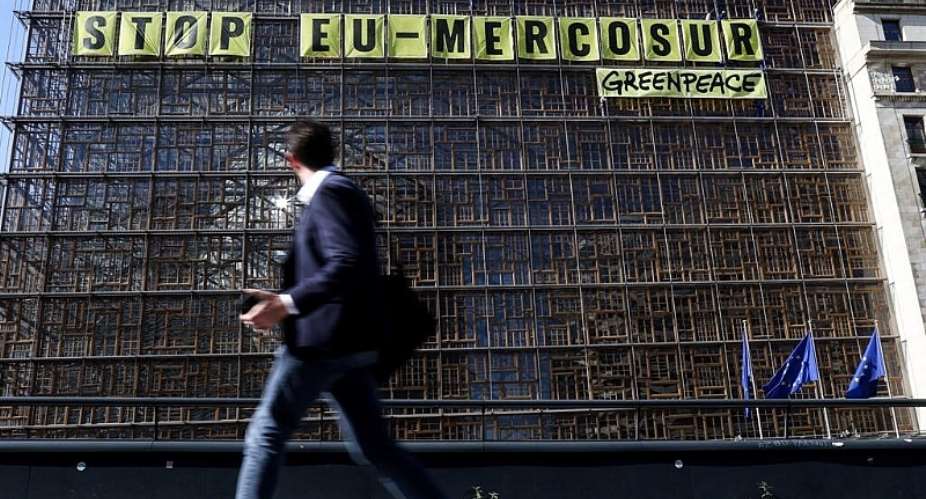While French President Emmanuel Macron has called a proposed trade pact between the European Union and South America's Mercosur bloc "very bad", analysts say it has its advantages for France.
Speaking at a business forum in Brazil this week, Macron said the deal, as it stands, did not include sufficient climate guarantees.
"There is nothing that takes into consideration the subject of biodiversity and climate – nothing," Macron said as he asked for a new deal to be forged.
The long-awaited deal between the EU and the Mercosur bloc of Brazil, Argentina, Uruguay and Paraguay would create a free-trade area of more than 750 million people. First agreed in 2019, it has been on hold since then due to various European concerns.
While Brazil says it is ready to sign, France continues to express reservations. Its farmers have objected to the prospect of allowing in agricultural imports, notably beef, that do not meet strict EU standards.
"We still have time... We should not give up on this deal," said Brazilian Finance Minister Fernando Haddad, speaking at the same event as Macron.
Haddad added that Brazilian President Luiz Inacio Lula da Silva would continue to seek a closer relationship with the European market.
Talks with the EU continue. Earlier this month, European officials said "decisive progress" was possible by July.
Trade imbalance
Under Macron, France has proved one of the EU members most reluctant to sign.
Agathe Demarais, a senior research fellow with the European Council of Foreign Relations, argues that Macron's reservations reflect France's complex domestic politics: he does not have a parliamentary majority and worries that far-right parties could use the perceived downsides of a deal on France's beef and poultry sectors to draw votes from farmers in European elections in June.
Proponents of the deal usually point to the vastness of the free-trade area it would create, covering about 20 percent of the global economy.
But, says Demarais, the economic impact on the EU would be small; estimates say the deal would boost the EU's GDP by no more than 0.3 percent.
Total trade between Europe and Mercosur economies remains modest: the Latin American countries take just 2 percent of the EU's global exports.
According to the South American bloc's figures, it exported the equivalent of €3.2 billion of goods to France in 2023 and imported €6.4 billion – creating a trade deficit for Mercosur of €3.2 billion.
Meanwhile the overall trade balance between Mercosur and the EU is €50.4 billion exports to €54 billion imports, leaving Mercosur with a deficit of €3.6 billion.
Compare this with the EU's trade with China: in 2023 alone, according to Eurostat, the EU's statistics office, the EU trade deficit with China was a staggering €291 billion, a decrease of 27 percent over 2022.
Pivot from China
Observers see this as an argument to proceed with the Mercosur deal.
Increased dealings with the Mercosur group could help the EU's attempts to "de-risk" its relationship with China, says analyst Demarais.
"European institutions are hard at work trying to find ways to convince EU firms to relocate supply chains away from China, ideally to like-minded countries (read: democracies). The EU-Mercosur free trade agreement would help to do just that," she argues.
Meanwhile Mercosur may look to sign its own free-trade agreement with China, which could prove a swifter process than dealing with the EU.
"This could weaken the EU's negotiating position if China imposes fewer conditions on Mercosur," suggests Detlef Nolte, a specialist on Latin America at the German Council on Foreign Affairs and the German Institute for Global and Area Studies, writing on online media platform Latinoamérica21.
Vital raw materials
On top of that, by lowering tariffs on European exports to Mercosur economies – for instance cutting the 18 percent tariff on chemicals and a 14-20 percent tariff on machinery – the deal "could help to convince European firms to develop production lines in Latin America", Demarais suggests.
She also points out that Mercosur countries possess large reserves of raw materials critical to the EU's green energy transition.
Brazil, for instance, sits on one-fifth of the world's reserves of graphite, nickel, manganese and rare earths, while Argentina has the world's third-largest reserves of lithium, used for batteries in electric vehicles.
Read also:





 Lay KPMG audit report on SML-GRA contract before Parliament – Isaac Adongo tells...
Lay KPMG audit report on SML-GRA contract before Parliament – Isaac Adongo tells...
 Supervisor remanded for stabbing businessman with broken bottle and screwdriver
Supervisor remanded for stabbing businessman with broken bottle and screwdriver
 NDC watching EC and NPP closely on Returning Officer recruitment — Omane Boamah
NDC watching EC and NPP closely on Returning Officer recruitment — Omane Boamah
 Your decision to contest for president again is pathetic – Annoh-Dompreh blasts ...
Your decision to contest for president again is pathetic – Annoh-Dompreh blasts ...
 Election 2024: Security agencies ready to keep peace and secure the country — IG...
Election 2024: Security agencies ready to keep peace and secure the country — IG...
 People no longer place value in public basic schools; new uniforms, painting wil...
People no longer place value in public basic schools; new uniforms, painting wil...
 'Comedian' Paul Adom Otchere needs help – Sulemana Braimah
'Comedian' Paul Adom Otchere needs help – Sulemana Braimah
 Ejisu by-election: Only 33% of voters can be swayed by inducement — Global InfoA...
Ejisu by-election: Only 33% of voters can be swayed by inducement — Global InfoA...
 Minority will expose the beneficial owners of SML, recover funds paid to company...
Minority will expose the beneficial owners of SML, recover funds paid to company...
 Prof. Opoku-Agyemang has ‘decapitated’ the NPP’s strategies; don’t take them ser...
Prof. Opoku-Agyemang has ‘decapitated’ the NPP’s strategies; don’t take them ser...
